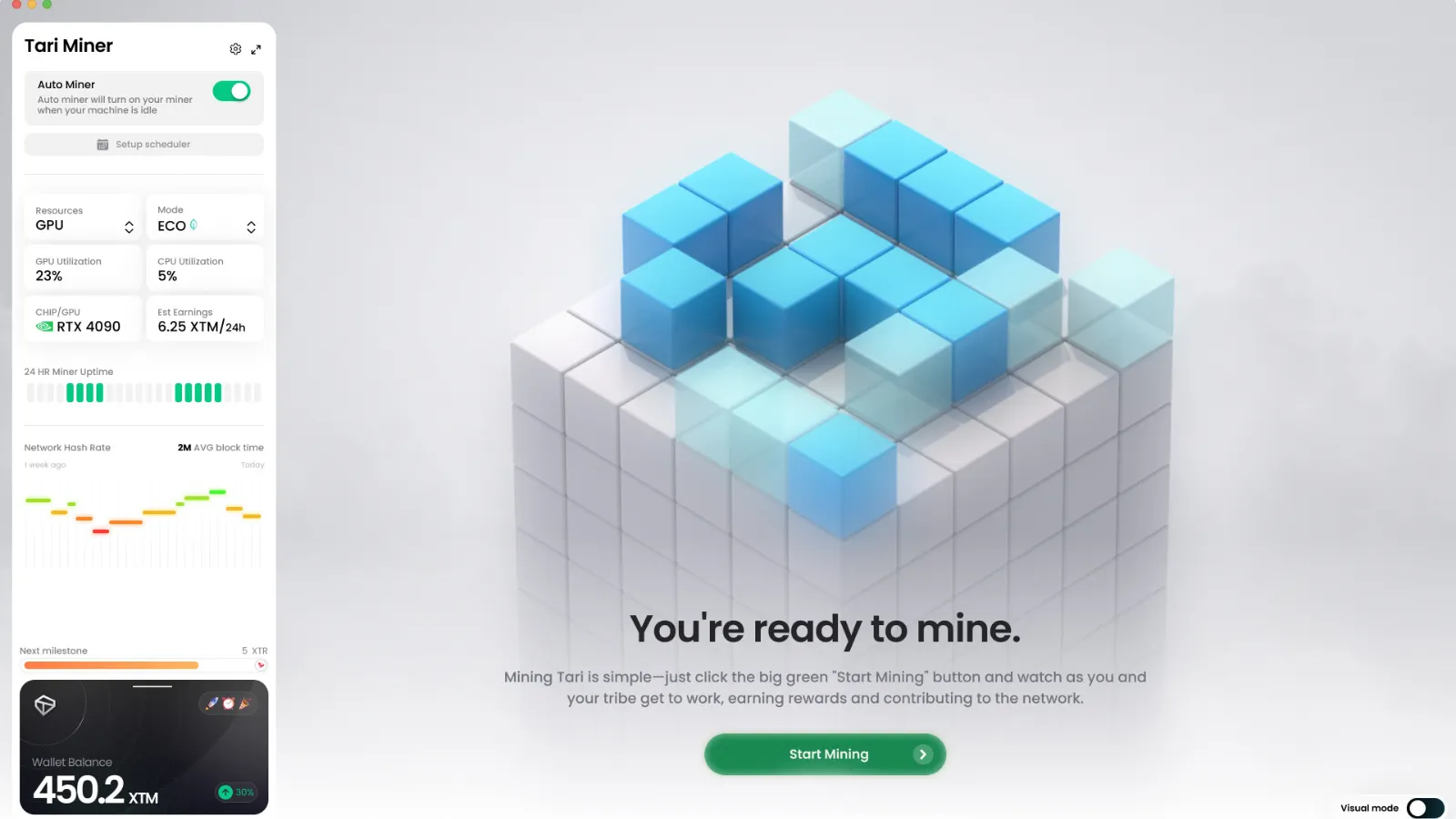In a bid to simplify the complex world of cryptocurrency for a new generation, a group of former Monero developers, including core contributor Riccardo Spagni (also known as “fluffypony”), are launching the testnet of their Tari Universe desktop application for mining the eponymous Tari token.
According to Tari contributor Naveen Jain, Tari was inspired by the early days of Bitcoin when anyone could mine cryptocurrency on their computer without the need for specialized equipment—before expensive, energy-consuming mining rigs became the norm.
“If you think about a new person who doesn't already have a MetaMask wallet installed and doesn't have an account with some exchange, how do they participate?” Jain, who was also an early Monero miner, told Decrypt.
“Back in the day when Bitcoin first launched, people could just mine Bitcoin on their existing computers—that's how this whole industry started,” he continued. “What if we brought things back to the way Bitcoin first started, where anyone can download free software from the internet, install it, and start to mine a new blockchain protocol?”
The Big Announcement 📣
Meet Tari Universe: the magical, beautiful, one-click miner for Tari
Want to be the first to try it on testnet? Join the waitlist now at https://t.co/TPOZKuOMFM
And now a thread on how Tari Universe will forever change crypto 🧵 pic.twitter.com/a5brllqJwc
— Tari (@tari) August 15, 2024
Jain said the Tari Universe mining software and testnet will go live on September 12, and the Tari mainnet will go live later this year.
In May, Tari announced that eligible community members could also earn airdropped Tari tokens by completing online quests, including likes and retweets on Twitter, joining the Tari Reddit community, and creating memes featuring Soon, Tari’s turtle mascot.
“[The Tari token] should be viewed similarly to a token like Ethereum,” he said. “It's the token that powers the entire network, it's a token that you'll be using to pay for transactions and use applications eventually on the Tari network.”
While Tari is its own blockchain, Jain explained, it uses a proof-of-work consensus algorithm like Bitcoin and benefits from the technology found in Monero, a leading privacy coin. He said that it uses a “hybrid” model that mines half of its blocks on Tari and half via merge mining on Monero.
However, Jain emphasized that Tari was separate from the privacy-centric Monero project.
“It's not accurate to say that Tari is a sidechain,” he said. “That being said, we are benefiting from Monero's security model on the RandomX side via merge mining.”
Merge mining refers to a process that allows miners to simultaneously mine two or more cryptocurrencies that use the same consensus protocol and hash function. As a result, miners can earn rewards from both networks without additional resources. Merge mining benefits smaller networks by enhancing security and cost efficiency.
Jain said using this approach benefits the Tari community because it will make the network more decentralized and accessible from day one.
“It doesn't matter that you believe that ETFs will save the day, or whatever you believe about your maximalist vision,” Jain said. “The reality is that the system is now a closed box—it's not an open, accessible thing—and all the new protocols that are launching are catering exclusively to the people who are already here.”
Addressing crypto community detractors who might question the need for something like Tari Universe, Jain reiterated the need to bring in new users and not rely solely on older cryptocurrencies like Bitcoin to do the job.
“What about the next generation? What about Gen Alpha, Gen Z, these new people?” Jain asked. “You literally came to the Bitcoin Conference here in Nashville, and you had a 78-year-old former president shilling Bitcoin from the stage. If that's not the definition of a boomer coin, I don't know what is.”

According to Jain, the Tari Universe software has two modes for mining tokens: ECO mode and Ludicrous Mode, the latter a reference to Mel Brook’s classic film “Spaceballs.”
Jain said ECO mode draws fewer resources from the computer, making it ideal for mining while the computer is in use. In contrast, Ludicrous Mode consumes more resources and is ideal for when the computer is not in use, such as overnight.
“You don't need to have custom, expensive hardware like you do to mine Bitcoin in order to mine Tari,” Jain said. “If you have an existing laptop or desktop computer, you can mine Tari.”

